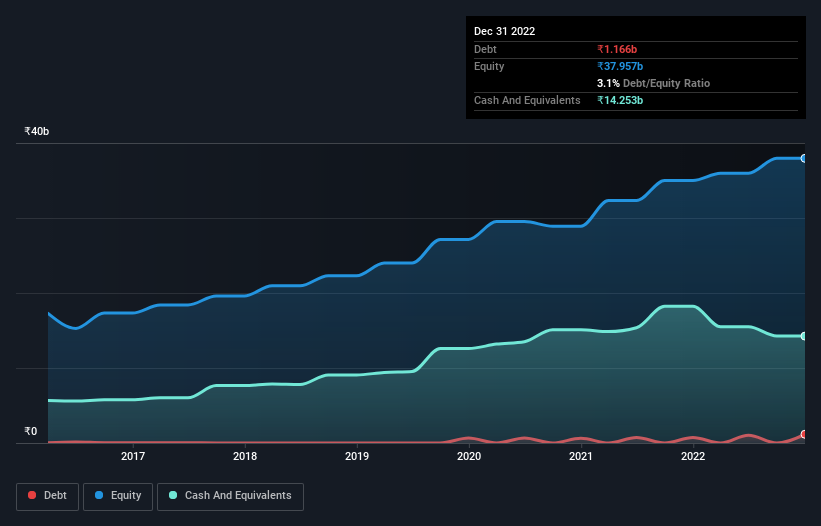Legendary fund manager Li Lu (who Charlie Munger backed) once said, 'The biggest investment risk is not the volatility of prices, but whether you will suffer a permanent loss of capital.' So it might be obvious that you need to consider debt, when you think about how risky any given stock is, because too much debt can sink a company. Importantly, Mahanagar Gas Limited (NSE:MGL) does carry debt. But should shareholders be worried about its use of debt?
When Is Debt A Problem?
Debt and other liabilities become risky for a business when it cannot easily fulfill those obligations, either with free cash flow or by raising capital at an attractive price. If things get really bad, the lenders can take control of the business. However, a more usual (but still expensive) situation is where a company must dilute shareholders at a cheap share price simply to get debt under control. Of course, the upside of debt is that it often represents cheap capital, especially when it replaces dilution in a company with the ability to reinvest at high rates of return. When we examine debt levels, we first consider both cash and debt levels, together.
See our latest analysis for Mahanagar Gas
How Much Debt Does Mahanagar Gas Carry?
You can click the graphic below for the historical numbers, but it shows that as of September 2022 Mahanagar Gas had ₹1.17b of debt, an increase on ₹744.7m, over one year. However, it does have ₹14.3b in cash offsetting this, leading to net cash of ₹13.1b.

How Healthy Is Mahanagar Gas' Balance Sheet?
Zooming in on the latest balance sheet data, we can see that Mahanagar Gas had liabilities of ₹14.8b due within 12 months and liabilities of ₹3.26b due beyond that. Offsetting this, it had ₹14.3b in cash and ₹2.85b in receivables that were due within 12 months. So it has liabilities totalling ₹959.0m more than its cash and near-term receivables, combined.
This state of affairs indicates that Mahanagar Gas' balance sheet looks quite solid, as its total liabilities are just about equal to its liquid assets. So it's very unlikely that the ₹86.5b company is short on cash, but still worth keeping an eye on the balance sheet. While it does have liabilities worth noting, Mahanagar Gas also has more cash than debt, so we're pretty confident it can manage its debt safely.
But the other side of the story is that Mahanagar Gas saw its EBIT decline by 5.8% over the last year. If earnings continue to decline at that rate the company may have increasing difficulty managing its debt load. When analysing debt levels, the balance sheet is the obvious place to start. But you can't view debt in total isolation; since Mahanagar Gas will need earnings to service that debt. So when considering debt, it's definitely worth looking at the earnings trend. Click here for an interactive snapshot.
Finally, while the tax-man may adore accounting profits, lenders only accept cold hard cash. While Mahanagar Gas has net cash on its balance sheet, it's still worth taking a look at its ability to convert earnings before interest and tax (EBIT) to free cash flow, to help us understand how quickly it is building (or eroding) that cash balance. Looking at the most recent three years, Mahanagar Gas recorded free cash flow of 38% of its EBIT, which is weaker than we'd expect. That weak cash conversion makes it more difficult to handle indebtedness.
Summing Up
While it is always sensible to look at a company's total liabilities, it is very reassuring that Mahanagar Gas has ₹13.1b in net cash. So we don't have any problem with Mahanagar Gas's use of debt. The balance sheet is clearly the area to focus on when you are analysing debt. But ultimately, every company can contain risks that exist outside of the balance sheet. These risks can be hard to spot. Every company has them, and we've spotted 2 warning signs for Mahanagar Gas you should know about.
If you're interested in investing in businesses that can grow profits without the burden of debt, then check out this free list of growing businesses that have net cash on the balance sheet.
New: Manage All Your Stock Portfolios in One Place
We've created the ultimate portfolio companion for stock investors, and it's free.
• Connect an unlimited number of Portfolios and see your total in one currency
• Be alerted to new Warning Signs or Risks via email or mobile
• Track the Fair Value of your stocks
Have feedback on this article? Concerned about the content? Get in touch with us directly. Alternatively, email editorial-team (at) simplywallst.com.
This article by Simply Wall St is general in nature. We provide commentary based on historical data and analyst forecasts only using an unbiased methodology and our articles are not intended to be financial advice. It does not constitute a recommendation to buy or sell any stock, and does not take account of your objectives, or your financial situation. We aim to bring you long-term focused analysis driven by fundamental data. Note that our analysis may not factor in the latest price-sensitive company announcements or qualitative material. Simply Wall St has no position in any stocks mentioned.
About NSEI:MGL
Excellent balance sheet and good value.
Similar Companies
Market Insights
Community Narratives



